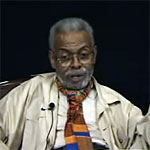Amiri Baraka
 Amiri Baraka studied philosophy and religious studies at Rutgers University, Columbia University and Howard University without obtaining a degree. In 1954 he joined the US Air Force reaching the rank of sergeant. After an anonymous letter to his commanding officer accusing him of being a communist led to the discovery of Soviet writings, Baraka was put on gardening duty and given a dishonorable discharge for violation of his oath of duty. The same year he moved to Greenwich Village working initially in a warehouse for music records. From this period stems his interest in jazz. At the same time he came into contact with the incipient movement of Beat Poets that was going to have a powerful influence on his early poetry. In 1958, Jones founded Totem Press, which published such Beat icons as Jack Kerouac and Allen Ginsberg. The same year he married Hettie Cohen and with her became joint editor of the Yugen literary magazine (until 1963).
Amiri Baraka studied philosophy and religious studies at Rutgers University, Columbia University and Howard University without obtaining a degree. In 1954 he joined the US Air Force reaching the rank of sergeant. After an anonymous letter to his commanding officer accusing him of being a communist led to the discovery of Soviet writings, Baraka was put on gardening duty and given a dishonorable discharge for violation of his oath of duty. The same year he moved to Greenwich Village working initially in a warehouse for music records. From this period stems his interest in jazz. At the same time he came into contact with the incipient movement of Beat Poets that was going to have a powerful influence on his early poetry. In 1958, Jones founded Totem Press, which published such Beat icons as Jack Kerouac and Allen Ginsberg. The same year he married Hettie Cohen and with her became joint editor of the Yugen literary magazine (until 1963).
In 1960 he went to Cuba, a visit that initiated his transformation into a politically active artist. In 1961 Preface to a Twenty Volume Suicide Note was published, followed in 1963 by Blues People: Negro Music in White America - to this day one of the most influential volumes of jazz criticism, especially in regard to the then beginning Free Jazz movement. His play Dutchman premiered in 1964 and the same year he won an Obie Award for it. After the killing of Malcolm X he broke with the Beat Poets, left his wife and their two children and moved to Harlem because, at the time, he thought of himself as a black cultural nationalist.






